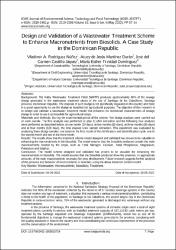/admin/item?itemID=1f3aaad1-8f61-402a-9d22-e6742b45271a
Design and validation of a wastewater treatment scheme to enhance macronutrients from biosolids. A case study in the Dominican Republic

View/
Type of Access
OpenMaterial Type
ArticleType of Content
Scientific researchLanguage
EnglishCollection
- Investigación ambiental [1758]
Metadata
Show full item record| Abstract: | Background: The Rafey Wastewater Treatment Plant (WWTP) produces approximately 80% of the sewage sludge generated in the wastewater treatment plants of the city of Santiago de los Caballeros, Santiago province, Dominican Republic. The disposal of such sludge is not specifically regulated in the country and there is a great opportunity to use the sludge as biosolids for agricultural purposes. The objective of this research is to design and validate a wastewater treatment model that enhances the nutritional characteristics of sewage sludge in order to use it as biosolids for agricultural crops. Materials and Methods: During the experimental period of the scheme, five sludge analyses were carried out on each sample. The first analysis was performed at (day 1) after extraction and the following four analyses were performed as described below: at one month (30 days), at two months (60 days), at three months (90 days) and at four months (120 days), the time elapsed since sample extraction. This experiment was evaluated by analysing three sludge samples, one taken in the first month of the nitrification and denitrification cycle, one in the second month and one in the third month. Results: The results show that the treatment scheme model designed and validated has proven to be valuable in enhancing the macronutrients in the biosolids. The model ensures that the biosolids produced contain the main macronutrients needed by the crops, such as Total Nitrogen, Calcium, Total Phosphorus, Magnesium, Potassium and Sulphur. Conclusion: The model scheme designed and validated has proven to be valuable for enhancing the macronutrients in biosolids. The model ensures that the biosolids produced show the presence, in appropriate amounts, of the main macronutrients necessary for crop development. Future research suggests further analysis of the presence and behavior of micronutrients in biosolids, using the above treatment scheme model. |
| Author(s): | Rodríguez Núñez, Vladimir Antonio
Martínez Durán, Atuey de Jesús Castillo Jáquez, José del Carmen Trinidad Domínguez, María Esther |
| Date: | 2022 |
| Published: | IOSR Journal of Environmental Science, Toxicology and Food Technology, 16(5), 7-14 |
| Citation: | Rodríguez Núñez, V., Martínez Durán, A., Castillo Jáquez, J. y Trinidad Domínguez, M. (2022). Design and validation of a wastewater treatment scheme to enhance macronutrients from biosolids. A case study in the Dominican Republic. IOSR Journal of Environmental Science, Toxicology and Food Technology, 16(5), 7-14. Recuperado de: |
| URI: | https://bvearmb.do/handle/123456789/3746
|
